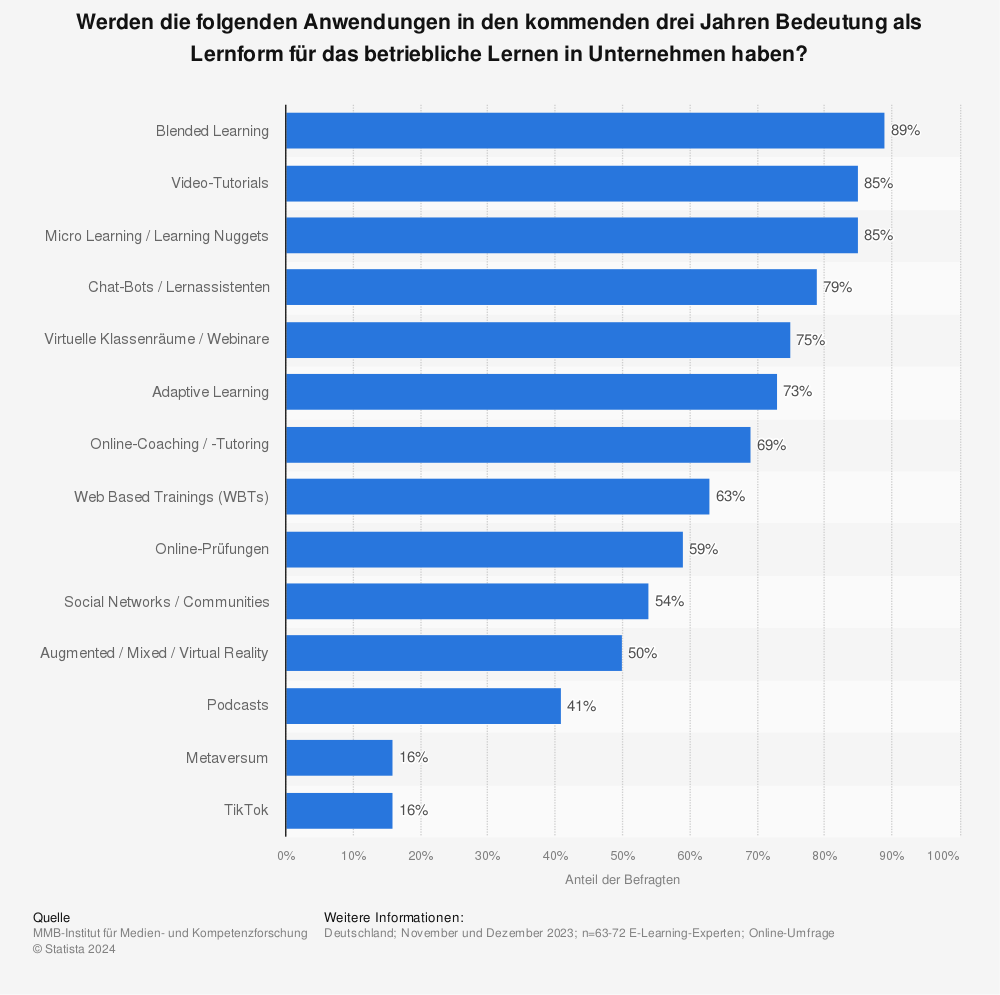E-learning study shows: The digital learning boom continues

The eLearning BENCHMARKING Study 2024 by the eLearning Journal with the Haufe Akademie shows: Digital learning has established itself in companies after coronavirus. The 2024 study investigated how sustainable digital learning methods are in companies after the coronavirus pandemic. Because during the crisis, companies were forced to resort to digital training offers - now they have the choice. To this end, employees and managers from companies of various sizes and industries in the DACH region were surveyed.
Digital learning remains widespread
One key finding of the study is that the digital learning boom is continuing. The E-Learning Study 2024 shows that digital learning has established itself since the coronavirus pandemic. This is not a short-term trend resulting from the crisis, but a sustainable development in continuing vocational training. Two years after the end of the pandemic measures, 88% of participants in the study still state that digital learning is taking place in their companies. Only a minimal decline compared to the time of the pandemic.
Budgets for digital learning remain stable
The statement that digital learning is taking place still says little about the relevance of digital learning in companies. According to the study, digital learning accounts for around a third of training budgets(33.4%) and therefore occupies a significant position in the training and development mix of the companies surveyed. In addition, the budget for e-learning itself remains stable or is even growing slightly.

Soft skills training and video formats are gaining relevance
In addition to traditional areas such as compliance and software training, soft skills are increasingly becoming the focus of learning needs that are covered by digital learning opportunities. There are increasingly standardized e-learning offers for this. Almost half of companies provide digital training in this area. According to the e-learning study, the format of the hour is video (84.7%), which for the first time has displaced the previous top dog of web-based training (83.2%).
Digital learning: convincing added value
Once introduced, digital learning in companies is here to stay.This is because the advantages of e-learning are convincing: the flexibility in terms of time and location, scalability of digital learning, cost savings (e.g. by avoiding travel costs) and better measurability of learning success are particularly emphasized.
Self-directed learning: trend or hype?
The e-learning study deals specifically with the experience of self-determined learning. This is no longer a trendy topic, but an integral part of in-company training. However, it requires specific framework conditions, a certain learning culture and, above all, time - and unfortunately this is often lacking.
Our conclusion on the 2024 e-learning study
The eLearning BENCHMARKING Study 2024 makes it clear: in 88% of companies, digital learning methods have become an integral part of continuing education strategies. This profound transformation of the learning culture is not a temporary trend, but a long-term investment in the skills development of employees.
But why? The flexibility and scalability of e-learning, its adaptability to new learning areas such as AI skills and advantages in cost efficiency underline its lasting value. The digital transformation in continuing education is far more than a crisis response - it is a deliberate step towards a more efficient and sustainable learning culture.
For detailed results with further insights into corporate digital learning, the complete E-Learning Study 2024 can be downloaded here.
Forecast e-learning
Based on our e-learning study and the mmb trend monitor "Learning Delphi 2024/2025", we can derive a forecast for the development of e-learning for corporate learning. If we look at the coming years together, four major topics can be identified:
1. artificial intelligence (AI) is becoming the dominant factor
The central importance of AI-supported forms of learning in vocational training will increase massively over the next three years.
- Chatbots and learning assistants will play a central role.
- Adaptive learning will become much more important. It is considered to be of central importance by 83 percent of respondents.
- AI as the most important learning content: For the first time, the topic of "artificial intelligence" has replaced "future skills" as the most important learning topic for digital vocational training.
2. shift in traditional forms of learning
Formats that had gained significant relevance during the coronavirus pandemic, such as synchronous distance learning formats, are likely to lose importance or stagnate.
- Blended learning is losing minimal relevance (down from 89% to 83%). Virtual classrooms/webinars have also lost relevance (from 97% in 2020 to 69% in 2024).
- Lasting importance of video and microlearning: Video tutorials (90%) and microlearning / learning nuggets (87%) are still considered to be of central importance. These formats are well suited to self-learning.
3. increasing relevance of new/immersive technologies
- The importance of augmented, virtual and mixed reality is steadily increasing (from 20% in 2014 to 59% in 2024). However, only a minority (31%) expect VR goggles to become generally accepted as a natural learning tool.
- Collaborative learning and social learning: Social networks/communities are regaining relevance (65% consider them to be of central importance, +11 points compared to the previous year).
4. challenges and "reality gap"
Despite all the technological forecasts and the success of AI, there is still a "reality gap" between theoretical possibilities and practical implementation.
- Self-directed learning is supported, but not fully utilized: Although the majority of companies (75.4%) support self-directed learning, 62.2% of employees only make partial use of the available learning time.
- Obstacles remain organizational: The biggest obstacles to self-directed learning are too much work (83.3%), an unsuitable learning or corporate culture (43.3%) and a lack of support from superiors (40.8%).
- Stability of infrastructure: Learning Management Systems (LMS) are the most important educational technology with 84.2% of responses, and SCORM is the most important format for providing e-learning content with 77.7%.
You might also be interested in










